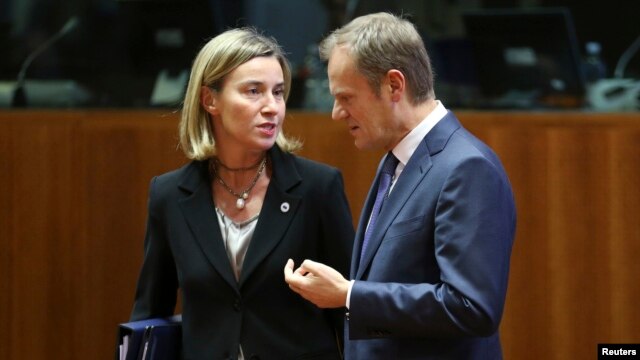EU adopts new Crimea sanctions as summit weighs crisis
| Publisher | Radio Free Europe/Radio Liberty |
| Publication Date | 18 December 2014 |
| Cite as | Radio Free Europe/Radio Liberty, EU adopts new Crimea sanctions as summit weighs crisis, 18 December 2014, available at: https://www.refworld.org/docid/54be130b15.html [accessed 1 June 2023] |
| Disclaimer | This is not a UNHCR publication. UNHCR is not responsible for, nor does it necessarily endorse, its content. Any views expressed are solely those of the author or publisher and do not necessarily reflect those of UNHCR, the United Nations or its Member States. |
Last updated (GMT/UTC): 18.12.2014 15:54
By RFE/RL
 EU foreign policy chief Federica Mogherini (left) talks to European Council President Donald Tusk in Brussels on December 18.
EU foreign policy chief Federica Mogherini (left) talks to European Council President Donald Tusk in Brussels on December 18.
The European Union on December 18 agreed to new sanctions against Moscow-annexed Crimea as EU leaders prepared to discuss a "tough and responsible" strategy toward Russia following its involvement in Ukraine.
The new measures ban all investment in Crimea and cruise ships from its ports as further punishment for Russia's annexation of the region from Ukraine in March.
European Council President Donald Tusk said ahead of a summit in Brussels December 18, "We should send a strong signal on our readiness to further support Ukraine, also financially, as we have done politically today by making the existing sanctions on Crimea and Sevastopol more effective."
Tusk – the former Polish prime minister – is chairing his first meeting of EU leaders since taking over from Herman Van Rompuy as European Council chief on December 1.
Meanwhile, the Russian Foreign Ministry said new EU sanctions imposed on Crimea on December 18 are "absolutely unacceptable."
The December 18 move came after EU foreign ministers decided last month that the EU's nonrecognition policy toward Russia's annexation of Crimea needed to be bolstered with tougher sanctions.
The ban prohibits EU citizens and EU-registered companies from buying real estate in Crimea, from setting up joint ventures with Crimean companies, and from buying Crimean firms, their shares, or other securities.
It also bans the sale, export, or transport of goods using EU-registered vessels and aircraft to Crimean firms in the sectors of transport, telecommunications, and energy – including the exploration and production of oil, natural gas, and mineral resources.
In the tourism sector, EU cruise ships are banned from calling at any port on the Crimean Peninsula.
Upon arrival in Brussels, EU foreign policy chief Federica Mogherini said she would brief the summit on talks held with Ukrainian officials this week.
Mogherini voiced concern over the economic woes of Russia, but said Russian President Vladimir Putin and other senior Russian officials "should reflect seriously about the need for introducing a radical change in the attitude toward the rest of the world and to switch to a cooperative mode."
But French President Francois Hollande sounded a more optimistic note, saying the EU could de-escalate sanctions against Russia if Moscow delivers on commitments to end the crisis in Ukraine.
"I consider that if today Russia sends the signals we expect, then there is no need for new sanctions," Hollande said as he arrived for the summit. He added, "On the contrary, it would be for us to think about how we, too, could begin a de-escalation."
The summit in Brussels will also back a huge 315 billion euro ($380 billion) investment plan aimed at kickstarting Europe's stalling economy.
With contributions from RFE/RL's Rikard Jozwiak in Brussels and additional reporting by Reuters and AP
Link to original story on RFE/RL website
